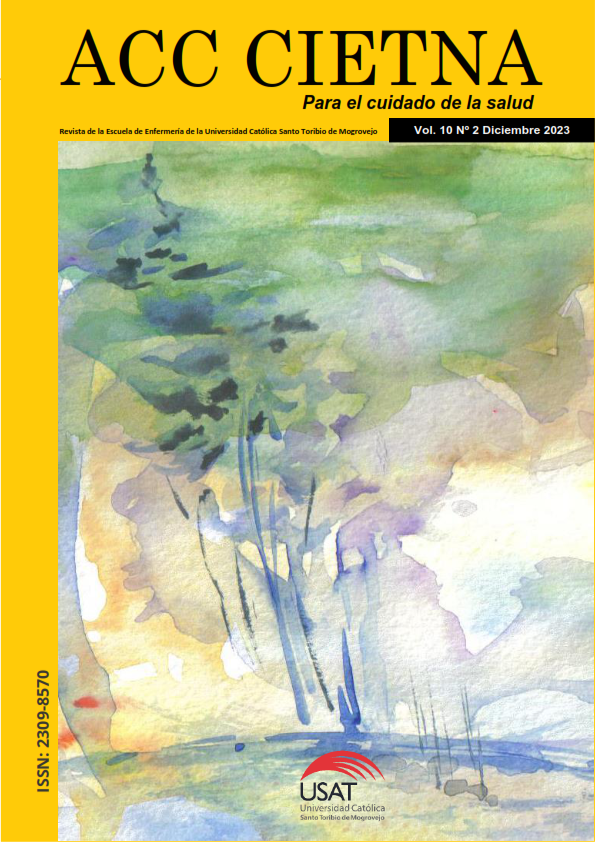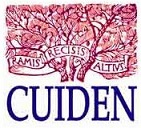Attitudes towards breastfeeding associated with exclusive breastfeeding practice in Mexican mothers
Abstract
Objective: Determine the association between attitudes towards breastfeeding and the practice of exclusive breastfeeding in Mexican mothers. Material and method: The study design was descriptive, correlational and cross-sectional. The sample was 169 mothers. Biological mothers with at least one child from 0 to 24 months of age and with signed informed consent were included. We used a sociodemographic data card, the Scale of Attitudes towards Infant Feeding and questions about the practice of breastfeeding. We calculated univariate and bivariate descriptive statistics. Results: The sample of this study involved 169 dyads (mother and son). The mean age of the mothers was 27,22 (SD = 5,70) years. According to attitudes towards feeding, 59,80% reported a neutral attitude towards infant feeding. 52,10% of mothers reported that they would stop breastfeeding after 12 months of age. 83,10% of mothers give exclusive breast milk to their child under 6 months of birth. A weak significant association was found between attitudes towards breastfeeding associated with age in months of abandoning exclusive breastfeeding (X2 (2, 169) = 11,40, p<0,022). Conclusions: The mothers reported that their children received breast milk in the first hour of birth, although the frequency decreased as the child grew. There was an association between positive attitudes towards breastfeeding with breastfeeding practice in the first six months after birth.
Downloads
References
Organización Mundial de la Salud. Alimentación del lactante y del niño pequeño [Internet]. Ginebra: OMS; 2021 [citado 2023 Abr 19]. Disponible en: https://bit.ly/3NqwNNa
Organización Panamericana de la Salud y Organización Mundial de la Salud. Lactancia materna y alimentación complementaria [Internet]. Washington, DC: Organización Panamericana de la Salud; 2021 [citado 2023 Abr 19]. Disponible en: https://bit.ly/3NqwNNa
Fondo de las Naciones Unidas para la Infancia e Instituto Nacional de Salud Pública. Encuesta Nacional de Niños, Niñas y Mujeres 2015 [Internet]. México: UNICEF; 2015. [citado 2022 Feb 9]. Disponible en: https://bit.ly/3Re9Ttq
Fondo de las Naciones Unidas para la Infancia. 8a Fiesta Mexicana de la Lactancia [Internet]. México: UNICEF; 2019 [citado 2023 Abr 20]. Disponible en: https://bit.ly/3NO4zfN
Fondo de las Naciones Unidas para la Infancia e Instituto Nacional de Salud Pública. Prácticas de lactancia materna en México [Internet]. México: UNICEF; 2017 Jun [citado 2023 Abr 19]. Disponible en: https://bit.ly/3RkAiWH
Shamah-Levy T, Vielma-Orozco E, Heredia-Hernández O, Romero-Martínez M, Mojica-Cuevas J, Cuevas-Nasu L, et al. Encuesta Nacional de Salud y Nutrición 2018-19: Resultados Nacionales. Cuernavaca, México: Instituto Nacional de Salud Pública [Internet]; 2020 [citado 2023 Abr 20]. Disponible en: https://bit.ly/48etIYK
González-Castell LD, Unar-Munguía M, Quezada-Sánchez AD, Bonvecchio-Arenas A, Rivera-Dommarco J. Situación de las prácticas de lactancia materna y alimentación complementaria en México: resultados de la Ensanut 2018-19. Salud Publica Mex [Internet]. 2020 [citado 2022 Feb 9]; 62(6): 704–13. Disponible en: https://bit.ly/3GE0xT8
Instituto Nacional de Estadística y Geografía. Principales resultados de la Encuesta Nacional de la Dinámica Demográfica 2018. Nota técnica [Internet]. México: INEGI; 2020 [citado 2022 Feb 9]. Disponible en: https://bit.ly/3H1cBOB
Procuraduría Federal del Consumidor. Leche materna hoy, salud y bienestar en el futuro [Internet]. México: Procuraduría Federal del Consumidor. 2020 [citado 2022 Feb 9]. Disponible en: https://bit.ly/3RG6rcw
Organización Panamericana de la Salud y Organización Mundial de la Salud. Semana Mundial de Lactancia Materna. [Internet]. Washington, DC: Organización Panamericana de la Salud; 2022 [citado 2023 May 23]. Disponible en: https://bit.ly/4amT7Bs
Centro Nacional para la Salud de la Infancia y Adolescencia. Programas de Acción Específica 2020-2024 [Internet]. Gobierno de México; 2021. [citado 2023 May 23]. Disponible en: https://bit.ly/41te0GT
De Roza JG, Fong MK, Ang BL, Sadon RB, Koh EYL, Teo SSH. Exclusive breastfeeding, breastfeeding self-efficacy and perception of milk supply among mothers in Singapore: A longitudinal study. Midwifery [Internet]. 2019 [citado 2023 May 23]: Dec;79: 102532. Disponible en: https://bit.ly/3tmbZzy
Basu S, Garg S, Sharma A, Arora E, Singh MM. The Hindi Version of the Breastfeeding Self-Efficacy Scale-Short Form: Reliability and Validity Assessment. Indian J Community Med [Internet]. 2020 [citado 14 Jun 2022];45(3):348–52. Disponible en: https://bit.ly/47VMDaK
Butcher HK, Bulechek GM, Wagner CM, Dochterman JM. Clasificación de intervenciones de enfermería (NIC). Elsevier; 2018.
Nguyen NT, Prasopkittikun T, Payakkaraung S, Vongsirimas N. Factors predicting six-month exclusive breastfeeding among mothers in Ho Chi Minh City, Vietnam. J Health Res [Internet]. 2022 [citado 14 jun 2023];36(2):219–30. Disponible en: https://bit.ly/472Hk8i
Zhang Z, Zhu Y, Zhang L, Wan H. What factors influence exclusive breastfeeding based on the theory of planned behaviour. Midwifery [Internet]. 2018 [citado 14 jun 2023];62:177–82. Disponible en: https://bit.ly/3TphmJ1
De La Mora A, Russell DW, Dungy CI, Losch M, Dusdieker L. The Iowa infant feeding attitude scale: Analysis of reliability and validity. J Appl Soc Psychol. [Internet]. 1999 [citado 14 jun 2023];29(11). Disponible en: https://bit.ly/3uTUHdv
Aguilar-Navarro HJ, Coronado-Castilleja A, Gómez-Hernández OJ, Cobos-Aguilar H. Adaptación de la Iowa Infant Feeding Attitude Scale en población mexicana. [Internet] 2016 [citado 2023 Jul 12];37(3):149–58. Disponible en: https://bit.ly/3GEO6GL
Centers for Disease Control and Prevention. Questionnaires: Breastfeeding and Infant Feeding Practices. [Internet] CDC; 2023 [citado 2023 Jul 12]. Disponible en: https://bit.ly/4aiesvG
Volker, Martin A. Reporting effect size estimates in school psychology research. Psychology in the Schools. [Internet] 2006 [citado 2023 Dic 13]; 43 (6). Disponible en: https://bitly.ws/35WCK
Abdulahi M, Fretheim A, Argaw A, Magnus JH. Determinants of knowledge and attitude towards breastfeeding in rural pregnant women using validated instruments in ethiopia. Int J Environ Res Public Health. [Internet] 2021 [citado 2023 Jul 12]; 18(15). Disponible en: https://bit.ly/3v0aqbd
Villegas Mera EV, Arriola Arízaga MC. Conocimientos y prácticas sobre Lactancia Materna Exclusiva en madres primíparas que acuden al Servicio de Crecimiento y Desarrollo del Hospital Naylamp, Chiclayo. ACC CIETNA: Revista de la Escuela de Enfermería. [Internet] 2018 [citado 2023 Jul 15]; 3(2). Disponible en: https://bit.ly/41n069h
Solís Salazar AK, Quiroz Hidalgo RM, Campos Bravo YL. El comienzo de la lactancia materna: experiencias de madres primerizas postcesárea en un hospital de Chiclayo – 2017. ACC CIETNA: Revista de la Escuela de Enfermería. [Internet] 2019 [citado 2023 Jul 15]; 6(1). Disponible en: https://bit.ly/48gWJTv
Naja F, Chatila A, Ayoub JJ, Abbas N, Mahmoud A, Abdulmalik MA, et al. Prenatal breastfeeding knowledge, attitude and intention, and their associations with feeding practices during the first six months of life: a cohort study in Lebanon and Qatar. Int Breastfeed J. [Internet] 2022 [citado 2023 Jul 15]; 17(1). Disponible en: https://bit.ly/3NshWSm
United Nations Children's Fund. Baby-Friendly Hospital Initiative. [Internet] UNICEF; 2018 [citado 2023 Jul 18]. Disponible en: https://bit.ly/3TkTsOH
Muelbert M, Giugliani ERJ. Factors associated with the maintenance of breastfeeding for 6, 12, and 24 months in adolescent mothers. BMC Public Health. [Internet] 2018 [citado 2023 Jul 15]; 18(1). Disponible en: https://bit.ly/3GF4yXk
Hagos D, Tadesse AW. Prevalence and factors associated with exclusive breastfeeding among rural mothers of infants less than six months of age in Southern Nations, Nationalities, Peoples (SNNP) and Tigray regions, Ethiopia: A cross-sectional study. Int Breastfeed J. [Internet] 2020 [citado 2023 Jul 15]; 15(1). Disponible en: https://bit.ly/3t9osH0
Wallenborn JT, Valera CB, Kounnavong S, Sayasone S, Odermatt P, Fink G. Urban-Rural Gaps in Breastfeeding Practices: Evidence From Lao People’s Democratic Republic. Int J Public Health. [Internet] 2021 [citado 2023 Jul 16]; 66. Disponible: https://bit.ly/3Nq1Zfw
Mensah KA, Acheampong E, Anokye FO, Okyere P, Appiah-Brempong E, Adjei RO. Factors influencing the practice of exclusive breastfeeding among nursing mothers in a peri-urban district of Ghana. BMC Res Notes. [Internet] 2017 [citado 2023 Jul 16];10(1). Disponible en: https://bit.ly/47X2RAs
Hasan M, Hassan MN, Khan MSI, Tareq MA, Afroj MS. Prevalence, knowledge, attitudes and factors associated with exclusive breastfeeding among mothers in Dhaka, Bangladesh: A cross-sectional study. Popul Med. [Internet] 2021[citado 2023 Jul 16]; 3. Disponible en: https://bit.ly/3tipctf
Ajzen I. Attitude, personality, and behavior. 2a ed. Berkshire: United Kingdom; Open University Press; 1988
Copyright (c) 2023 Luis Angel Jiménez Medina, Yazmín Alejandra Quintero Hernández, Alicia Álvarez Aguirre, Hilda Lissette López Lemus, María del Rosario Tolentino Ferrel, Elizabeth Guzman-Ortíz

This work is licensed under a Creative Commons Attribution 4.0 International License.
Los autores conservan los derechos de autor.
Esta obra está bajo una licencia internacional Creative Commons Attribution 4.0.
Los artículos publicados por la revista científica "Acc Cietna: para el cuidado de la salud" de la Escuela de Enfermería de la Universidad Católica Santo Toribio de Mogrovejo, Chiclayo, Perú están sujetos a una licencia internacional Creative Commons Attribution CC BY 4.0.




















 BIBLIOTECA USAT
BIBLIOTECA USAT